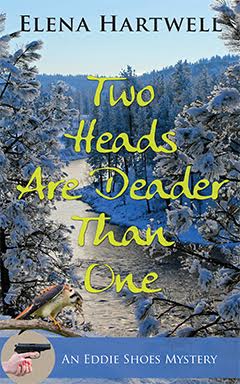
Welcome to another edition of Forensic Lenses
An investigative and exploratory approach into the minds of voracious readers everywhere.
Please welcome novelist, playwright and teacher Elena Hartwell!

Elena is the author of One Dead, Two to Go and Two Heads Are Deader Than One Both a part of the Eddie Shoes Mystery Series. She is also one of our wonderful participating authors in this year’s Mystery Thriller Week event. Beginning Feb. 12-22. Don’t miss it!


*Who influenced your reading habits the most as a child?
My parents taught me to love reading. I was read to extensively by both parents. My father would put his rocking chair in front of my and my older sister’s bedroom doors, and we would go to sleep to the sound of his voice and the shushing of the rocker on the hardwood floor. We read the Narnia series, the Hobbit and Lord of the Rings, Watership Down, all the great books. The other big influence I had as a child was my paternal grandmother. Granny read mysteries and westerns, she got me into those genres.
I love that they taught you a *love* of reading. That says much more than just reading itself.

*Who were your childhood heroes?
Nancy Drew. Misty of Chicoteague and the two kids who own her. Lucy in The Lion, The Witch, and the Wardrobe. Outside the literary world, probably Carl Jung. My parents had a Jungian library for a while. It was the 70s.
Oh wow. Carl Jung. I’ve been enjoying his work too, among others. ENFP’s rock!! Everyone’s heroes are unique.

*What sort of books did you read as a teenager?
Mysteries – Tony Hillerman, Sue Grafton, I loved the Jean Auel Clan of the Cave Bear series. I read a lot of Sci-Fi – Robert Heinlein, Asimov, Anne McCaffrey.
Lovely. I like Sci-fi too. Haven’t read Sue Grafton yet, unfortunately.
*Any particular books that shaped you in this time period?
Watership Down was a big one. And The Hobbit. I use The Hobbit all the time when I teach story structure. Little House on the Prairie series, I wanted to be Laura Ingalls. Any book about horses, I’m still in love with them.
YES. I just listened to the Hobbit audiobook and it was wonderful. I got a better realization of the story this time around.
“Reading changes us.”-T.Michael Martin
*How did you get into theater?
I dropped out of high school, so when I decided I was going back to school I had to start at a community college, because I didn’t qualify for a four-year. I started back, while working full-time as a bartender, and started with Spanish and Acting. Spanish because I’d need a language requirement and I’d been very good at it in high school. I grew up in San Diego, so there was a lot of Spanish spoken around me. I took Acting because I’d always thought it would be fun to try and I was easing into going back to school. I loved the acting class and went on to take every theater course Grossmont College offered, as well as working on a number of productions. I went on to get a theater minor at the University of San Diego, a M.Ed with an emphasis in teaching theater from UW-Tacoma, and a Ph.D. in dramatic theory and criticism from the University of Georgia. Throughout my educational years and beyond I continued to work professionally in theater and teach on the university level.
Very academic! I’d love to hear one of your classes!

*Name the core elements of a play, and what is its purpose?
This could be answered a number of ways. I’m going to go with dialogue, conflict, and universality. Dialogue, because despite the fact there is action in plays and we go to watch them, not just hear them, the basis of a play is the text written by the playwright, primarily in dialogue. Conflict, because without conflict there’s nothing to overcome, and if there’s nothing to overcome, there’s no tension or rising action or character development, and universality because it is through the specificity of a character or event that makes the experience of going to see theater universal. We have the opportunity to realize we often struggle through the same issues, regardless of race, ethnicity, politics, or religion. I can watch a play about a black family and feel it resonate with my own experiences, even though I’m white. I can watch a play about gay issues or struggles of faith, and while I’m straight and agnostic, I can still find common ground with the characters. It also creates the opportunity to recognize our own prejudices and hopefully become more accepting and compassionate.
Very interesting. I’ve actually only been to one play so I don’t anything about the subject. Thanks for sharing!

*How does the structure differ from a novel?
I would argue it really doesn’t, except there are no intermissions in a novel. I often hear people talk about “Three-act structure” – but as a playwright and novelist, I think novels are like One-Act plays, not Three-Act plays.
Interesting. I wish I could pick your brain more about this subject!
*Have you written any plays?
Several. I’ve been published and produced around the US, and parts of the UK and Canada.
Awesome. I wonder what happens next? Do you submit it to someone for casting?

*Name your top 5 favorite characters.
Bilbo Baggins from JRR Tolkien. Dorothy from the Wizard of Oz. Pryor from Angels in America. Bosch from Michael Connolly. Kinsey Millhone from Sue Grafton.
YES. Bilbo Baggins is a wonderful reluctant hero. LOVE Bosch.
*Did your taste in books change while in college?
Nope.
Simplicity is bliss.

*If all the books were going to be burned, yet you had your choice of three, which would you select?
The Oxford English Dictionary, Stephen King’s On Writing, and Strunk and White’s Elements of Style. Then we could write new ones.
Oh wow. This is s fascinating choice indeed. Then writing new ones! You have the right kind of spirit!!
*If you could pick any fictional character for a sibling who would it be? Brother or sister.
Merlin the Magician. He would be an awesome brother. Though Gandalf would be a close second.
I can see you love magic! Personally I’d take Gandalf.

*Name your favorite modern authors and what you appreciate about them.
Dennis Lehane, he writes stand alones, a contemporary series, and historical, I love his breadth. Gillian Flynn for her strong, unique voice and proof women can write terrible people too. Blake Crouch, I can’t put it into words why his books enthrall me so, but I can’t put them down once I start them. Sue Grafton for her sheer tenacity and so many years of wonderful books.
Historical fiction is now one of my favorites. Not so familiar with the others. At least I haven’t read them yet. (Don’t hate me).
*What books would you like to recommend to us?
Ordinary Grace by William Kent Krueger, The Life We Bury by Allen Eskens, Friday Night Lights by H.G. Bissinger, Bury Your Dead by Louise Penny, Burial Rites by Hannah Kent, Water for Elephants by Sara Gruen.
Awesome. I’ve come across William Kent Kreuger. Thanks for the recommendations!

THANKS ELENA!
Don’t be a stranger…
Benjamin Thomas
@thewritingtrain
http://www.mysterythrillerweek.com


